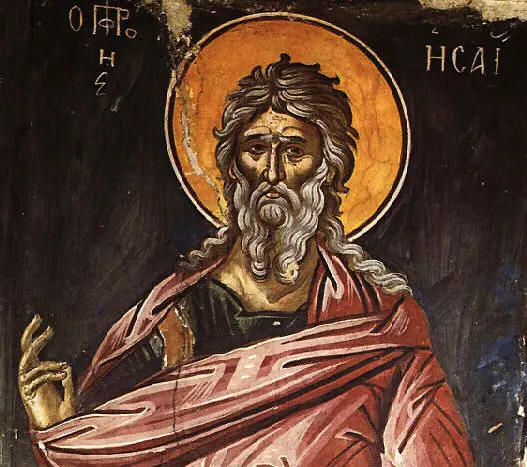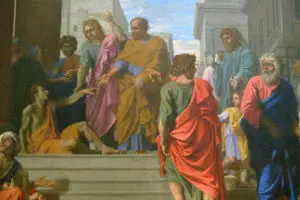There are four passages in Isaiah that are referred to as the Servant Songs because, in them, the Messiah is referred to as God’s servant.[1] The most familiar one is found in Isaiah 53, where the prophet writes of the future Messiah’s persecution and suffering, tragic end, and ultimate triumph. But few are familiar with the Servant Song of Isaiah 49, which details the Messiah’s commission from God. While an examination of both chapters reveals a decidedly human messiah, chapter 49 demonstrates how the coming king is subordinate to God and indeed has a God. This inspired depiction is in stark contrast to modern orthodoxy, which views Jesus as someone who is co-equal, co-eternal, and consubstantial with the God of Israel. In this post, we will examine the expectations set forth by the prophecy and how it compares to the orthodox view of Jesus as the God-Man.
Formed by God, Called by God
The prophecy begins with the future Messiah speaking of his origin and his calling:[2]
Isaiah 49:1 (NASB) Listen to Me, O islands, And pay attention, you peoples from afar. The LORD called Me from the womb; From the body of My mother He named Me. (emphasis added)
Isaiah 49:5 (NASB) And now says the LORD, who formed Me from the womb to be His Servant, To bring Jacob back to Him, so that Israel might be gathered to Him… (emphasis added)
The prophecy reveals that the LORD (Yahweh) formed, named, and called the Messiah to be His servant from his mother’s womb. In other words, the future savior’s origin, authority, and mission did not find their genesis in the Messiah but were instead ordained and orchestrated by God.

The Hebrew word translated formed in verse 5 is yatsar, and it means to form, to fashion. Luke’s birth narrative certifies that Isaiah’s prophecy was fulfilled in Jesus:
Luke 1:30-33 (NASB) The angel said to her, “Do not be afraid, Mary; for you have found favor with God. 31 “And behold, you will conceive in your womb and bear a son, and you shall name Him Jesus. 32 “He will be great and will be called the Son of the Most High; and the Lord God will give Him the throne of His father David; 33 and He will reign over the house of Jacob forever, and His kingdom will have no end.” (emphasis added)
Luke 2:21 (NASB) And when eight days had passed, before His circumcision, His name was then called Jesus, the name given by the angel before He was conceived in the womb. (emphasis added)
Some view this passage through the lens of a theorized incarnation. Even though the text says that God formed the Messiah in his mother’s worm, modern orthodoxy insists that a preincarnate Jesus came down from heaven, clothed in human flesh. But there is nothing in the text to suggest this decidedly non-Jewish interpretation. Rather, such a view stems from the Platonic belief that all men preexisted in heaven in perfect form before being incarnated in the earth.
What then does it mean that the Messiah was formed by God? To help us better understand this phrase, we must look at other instances where it is used. For example, Isaiah uses the same wording in chapter 43 to describe men in general:
Isaiah 43:7 (NASB) Everyone who is called by My name, And whom I have created for My glory, Whom I have formed, even whom I have made.” (emphasis added)
Here we see that God’s use of the phrase whom I have formed is synonymous with whom I have created and whom I have made. To be formed by God is to be made or created by God. This same idea and wording are used more specifically to describe the birth and calling of the patriarch Jacob, the prophet Jeremiah, and the apostle Paul:
Isaiah 44:1-2 (NASB) “But now listen, O Jacob, My servant, And Israel, whom I have chosen: 2 Thus says the LORD who made you and formed you from the womb, who will help you, ‘Do not fear, O Jacob My servant; And you Jeshurun whom I have chosen. (emphasis added)
Jeremiah 1:4-5 (NASB) Now the word of the LORD came to me [Jeremiah] saying, 5“Before I formed you in the womb I knew you, and before you were born I consecrated you; I have appointed you a prophet to the nations.” (emphasis added)
Galatians 1:15-16 (NASB) But when God, who had set me apart even from my mother’s womb and called me through His grace, was pleased 16 to reveal His Son in me so that I might preach Him among the Gentiles, I did not immediately consult with flesh and blood, (emphasis added)
We intuitively understand that to be formed in the womb means that these men were created by God without regard to having preexisted. Each one of them had a specific calling to serve God in their generation.[3] In like manner, Jesus was formed or created by God to serve God’s purpose in the earth. It is the Father’s will that he came to accomplish, not his own.
Equipped by God
Not only did God call the Messiah to be His servant, He also equipped him for his ministry:
Isaiah 49:2 (NASB) He has made My mouth like a sharp sword, In the shadow of His hand He has concealed Me; And He has also made Me a select arrow, He has hidden Me in His quiver. (emphasis added)
God made the Messiah a sharp sword and a select arrow, a weapon hidden in God’s quiver until the appointed time. These metaphors indicate that the Messiah’s divinely-given words are able to pierce men’s hearts, inflicting a wound (Hebrews 4:12-13). (We will see in the Servant Song of Isaiah 50:4 that God has also given the Messiah divine words that heal.) As a weapon of the LORD, the Messiah was to remain hidden until the appointed time (John 2:4; 7:6; Galatians 4:4).
In this short verse, the Messiah emphasizes four times that it is God who has made, concealed, and hidden His servant. God has faithfully equipped and prepared His servant for ministry.
God’s Purpose in Forming and Calling the Messiah
Isaiah 49 lists four related purposes for which God created and called the Messiah: to show God’s glory, to restore Israel, to be a light to the nations, and a covenant to the people.
Isaiah 49:3 (NASB) He said to Me, “You are My Servant, Israel, In Whom I will show My glory.”[4] (emphasis added)
Isaiah 49:5 (NASB) And now says the LORD, who formed Me from the womb to be His Servant, To bring Jacob back to Him, so that Israel might be gathered to Him (For I am honored in the sight of the LORD, And My God is My strength), (emphasis added)
Isaiah 49:6 (NASB) He says, “It is too small a thing that You should be My Servant To raise up the tribes of Jacob and to restore the preserved ones of Israel; I will also make You a light of the nations So that My salvation may reach to the end of the earth.” (emphasis added)
Isaiah 49:8 (NASB) Thus says the LORD, “In a favorable time I have answered You, And in a day of salvation I have helped You; And I will keep You and give You for a covenant of the people, To restore the land, to make them inherit the desolate heritages; (emphasis added)
Note in verse 3 that it is God’s glory that will be manifested in His servant. The glory does not belong to or originate with the Messiah but belongs to the God who formed and commissioned him to be His servant. Furthermore, we read that it is God’s salvation, not the Messiah’s, that will reach to the end of the earth. Indeed, it is God who will give the Messiah as a covenant for the people. God is the source, while Jesus is the instrument through whom God’s plan of salvation is going to be accomplished. Thus, it is God’s glory that will be manifested in His obedient servant.

The LORD (Yahweh) is His God
Perhaps the most revealing portion of Isaiah 49 is that the Messiah has a God:
Isaiah 49:4-5 (NASB) But I said, “I have toiled in vain, I have spent My strength for nothing and vanity; Yet surely the justice due to Me is with the LORD, And My reward with My God.” 5 And now says the LORD, who formed Me from the womb to be His Servant, To bring Jacob back to Him, so that Israel might be gathered to Him (For I am honored in the sight of the LORD, And My God is My strength) (emphasis added)
That the Messiah has a God would not be revelatory to Isaiah’s original audience, nor to the Christians of the first century. The servant of God would naturally be expected to be a subordinate follower of that same God. To be sure, when someone says they have a god, they are acknowledging that there is a being who is superior to themselves. By definition, God cannot have a God. It is only those who read Scripture through a 4th century creedal lens that find this truth surprising. But this is not the only time that Scripture declares that the Messiah has a God. More than twenty times, the Bible pointedly states that the Messiah, or more specifically, Jesus, has a God. Of those, Jesus himself declares nine times that he has a God, even after he has been exalted to God’s right hand.[5] It is this God that the Messiah of Isaiah 49 says formed him, called him, and supplies him with strength.
God-Man vs Human Messiah
As a part of this Servant Song prophecy, we read that God is going to reward His servant. Moreover, although the Messiah will be despised, abhorred, and the servant of rulers nevertheless, God will answer His chosen servant. He will keep him (i.e., watch over and guard him) and help him. Indeed, God will exalt His servant so that kings and princes will honor him. Is it because the Messiah is God and therefore inherently worthy of such honor? No, rather it will come to pass because the faithfulness of the LORD (Yahweh) will accomplish it:
Isaiah 49:7-8 (NASB) Thus says the LORD, the Redeemer of Israel and its Holy One, To the despised One, To the One abhorred by the nation, To the Servant of rulers, “Kings will see and arise, Princes will also bow down, Because of the LORD [Yahweh] who is faithful, the Holy One of Israel who has chosen You.” 8 Thus says the LORD, “In a favorable time I have answered You, And in a day of salvation I have helped You; And I will keep You and give You for a covenant of the people, To restore the land, to make them inherit the desolate heritages; (emphasis added)
Surely, a God-Man does not need God to answer him in the day of trouble. Nor does he need to be kept by God or helped by God. However, a truly human Messiah would need his God to help him fulfill his calling. As for rewards, how can a God-Man truly be rewarded for faithfully fulfilling his calling? Can God fail? If not, how could He be rewarded? If He can fail, how can He be God? Moreover, how can you genuinely reward a God who owns the universe? An impossible task to be sure. But it is quite reasonable and Biblical that a faithful human Messiah would be rewarded by his God for obedience. [6]
Isaiah 49 – It Is All God’s Doing
A survey of Isaiah 49’s Servant Song reveals that everything related to the Messiah, from his birth and commission to the success of his mission, is all God’s doing. It is God, that is, the LORD (Yahweh) who:
formed His servant in the womb
called His servant
named His servant
made His servant’s mouth a sharp sword
conceals His servant in the shadow of His hand
made His servant a select arrow and hidden him in His quiver
said He would show His glory through His servant (verse 3)
said He would raise up His servant to gather and restore Israel
will make His servant a light to the nations that His salvation would reach to the ends of the earth
will cause rulers to honor (rise and bow down before) His servant
will answer His servant
will help His servant
will keep His servant
will give His servant as a covenant to the people
Contrary to modern orthodoxy, which teaches that Jesus played an integral role in planning, ordaining, and fulfilling his mission, Isaiah attributes all of it to God. To be clear, it is not a triune God that this text speaks of, but a singular God, as evidenced by the use of singular personal pronouns. This less familiar Servant Song clearly portrays the coming Messiah as someone who is not God but is subordinate to the one true God. Indeed, this is the consistent testimony of all of Scripture. Tragically, it is not the testimony of modern orthodoxy.
[1] Isaiah 42:1-9; 49:1-13; 50:4-11; 52:13 through 53:12.
[2] Although in Isaiah’s day, the coming of the Messiah has yet to take place, it is spoken of here as if it has already occurred. Scholars refer to passages that speak of a future event as if it has already happened as the prophetic perfect or the already, not yet. This type of language was used to emphasize the certainty that a prophesied event would take place.
[3] Acts 13:36.
[4] Scholars agree that My Servant, Israel in this passage is a reference to the Messiah who would act as the “ideal Israel” and “the representative man of the nation” (Jamieson-Fausset-Brown Bible Commentary, Isaiah 49:2), fulfilling the call to be a light to the nations, something the nation of Israel was called to do but often failed. The Messiah, however, according to Isaiah 42, would succeed. https://biblehub.com/commentaries/jfb/isaiah/49.htm
[5] Messiah has a God: Psalm 22:1; 45:6-7; 89:26, Isaiah 49:4-5 (2x); Micah 5:4. Jesus has a God: Matthew 27:46 (2x); Mark 15:34 (2x); John 20:16-17; Romans 15:5-6; 2 Corinthians 1:2-3; 11:30-31; Ephesians 1:1-3; 1:15-17; Hebrews 1:8-9; 1 Peter 1:3; Revelation 1:4-6; 3:2; 3:12 (4x).
[6] See Hebrews 2:9; Hebrews 5:8; Philippian 2:8-11.
Jesus has a God: Matthew 27:46 (2x); Mark 15:34 (2x); John 20:16-17; Romans 15:5-6; 2 Corinthians 1:2-3; 11:30-31; Ephesians 1:1-3; 1:15-17; Hebrews 1:8-9; 1 Peter 1:3; Revelation 1:4-6; 3:2; 3:12 (4x).
[6] Isaiah 49:4.



